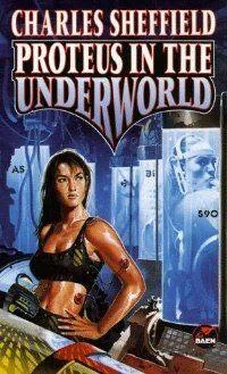Charles Sheffield - Proteus in the Underworld
Здесь есть возможность читать онлайн «Charles Sheffield - Proteus in the Underworld» весь текст электронной книги совершенно бесплатно (целиком полную версию без сокращений). В некоторых случаях можно слушать аудио, скачать через торрент в формате fb2 и присутствует краткое содержание. Год выпуска: 1995, ISBN: 1995, Издательство: Baen Books, Жанр: Фантастика и фэнтези, на английском языке. Описание произведения, (предисловие) а так же отзывы посетителей доступны на портале библиотеки ЛибКат.
- Название:Proteus in the Underworld
- Автор:
- Издательство:Baen Books
- Жанр:
- Год:1995
- ISBN:0-671-87659-7
- Рейтинг книги:3 / 5. Голосов: 1
-
Избранное:Добавить в избранное
- Отзывы:
-
Ваша оценка:
- 60
- 1
- 2
- 3
- 4
- 5
Proteus in the Underworld: краткое содержание, описание и аннотация
Предлагаем к чтению аннотацию, описание, краткое содержание или предисловие (зависит от того, что написал сам автор книги «Proteus in the Underworld»). Если вы не нашли необходимую информацию о книге — напишите в комментариях, мы постараемся отыскать её.
Proteus in the Underworld — читать онлайн бесплатно полную книгу (весь текст) целиком
Ниже представлен текст книги, разбитый по страницам. Система сохранения места последней прочитанной страницы, позволяет с удобством читать онлайн бесплатно книгу «Proteus in the Underworld», без необходимости каждый раз заново искать на чём Вы остановились. Поставьте закладку, и сможете в любой момент перейти на страницу, на которой закончили чтение.
Интервал:
Закладка:
The Cloudlanders have the economic clout, too, and they also have access to free comet fragments. But they look down their noses at anything going on in the inner system, Mars or Earth or any place else. The same is true of the Kernel Ring and the Kuiper Belt. To all of them, everything inside the orbit of Pluto is old, dull, and decadent. Nothing would be less interesting than the conversion of one inner planet to be like another one.
“I seemed to have run out of answers. No one had both means and motive. But then I thought again. There is one group in the solar system whose powers sometimes seem just about limitless, and whose motives I have never been able to fathom. I wondered, what about the Logian forms, hidden beneath the shroud of Saturn’s atmosphere? Weren’t they a candidate, too?”
Capman was shaking his head. “You know Logian stated policy: we do not interfere in the affairs of humans.”
“I do know your stated policy. And I know that you have always been very careful to phrase it just that way when we have spoken together. ‘Logian stated policy’—but not necessarily Logian actual policy. As for your opportunities to influence human actions, I can suggest three or four ways you might funnel resources into any solar system activity that you choose—and still have the final recipient unaware of the source.
“So it seemed to me that the means were there. The thing missing was motive. Logians can’t survive on either Mars or Earth. Why would they choose to help Old Mars in its efforts to terraform the planet?
“I couldn’t answer that question. But it suggested another idea: If the Logians were favoring the Mars terraforming efforts, that action opposed Georgia Kruskals desire to keep the surface just the way that it is. She can live there without a suit, in today’s conditions—provided that she has continuing access to form-change equipment. And that led me to one more thought: the people of every inhabited world in the system make use of form-change, but usually they do not depend on it. Everywhere, on every major body from Europa to Cloudland, the natural environment of each world is being changed so that humans can live there in their original form, without dependence on form-change. People in Cloudland choose to adopt a different shape, but that’s for convenience, not necessity. I have been to Cloudland, just as I am, and managed very well. But I couldn’t survive on the surface of Mars for five minutes. Unless it is terraformed, any human living there will depend on the use of form-change every day, just to remain alive.”
Bey paused, as though he had arrived at some profound and significant conclusion. Sondra, listening closely, could not begin to guess what it might be. And yet watching the body language of Bey Wolf and Robert Capman, it was clear to her that a crucial moment had been reached. The style of their interaction had changed. Bey was leaning forward expectantly, while Capman was nodding slowly in a gesture not at all like the bobbing motion of the Logian smile.
And when he finally spoke, it sounded like a total change of subject. “Behrooz Wolf.” The deep voice was slow and sad. “You have known me for many, many years. How would you describe my work, and its relationship to the science of purposive form-change?”
If the question surprised Bey, he did not show it. He replied at once. “You nave contributed more than anyone in the whole field since the original work of Ergan Melford, two hundred and fifty years ago. Until you adopted the Logian form and moved to Saturn, your whole life’s work revolved around the theory and practice of purposive form-change.”
“Very well. And your work?”
“I won’t try to estimate the value of what I’ve done. Someone else should make that assessment. But I can honestly say that for more than half a century I have worked constantly on form-change problems; and nothing else in my life has been as important to me as that effort.”
“We seem to be in total agreement. We have each devoted most of our lives to the same single end: the advancement of purposive form-change techniques. We have each—despite your modesty—made deep and far-reaching contributions to the subject, more than any other living persons.” Capman’s massive head lifted, and he stared straight at Bey. “So you, Behrooz Wolf, will find it as disturbing as I did, when I realized that purposive form-change, in widespread, necessary, and universal use, poses a great and terrible threat to the future of humanity. Does that answer your question?”
The gasp came from Sondra, not from Bey. He sat totally silent and still as Capman continued: “I should add that my interest in form-change work and its effects did not cease when I assumed the Logian form. We Logians are not human in appearance, and we sometimes appear to have superhuman powers; but in our concerns we remain all human. And we operate with a very long time-frame.”
“You say it’s a threat.” Bey spoke in a low voice and his face had become paler than usual. “I don’t see why. Form-change has done more good for more people than any other discovery in history. I’m not talking about trivial nonsense like cosmetic change, I mean the important things like birth defect correction and medical treatment and healthy old age.”
“All hugely important, and all hugely valuable. But not the whole story.” Capman swung to face Sondra.
“Miss Dearborn, you visited the Fugate Colony. Do you think you could mate with a Fugate?”
“Never.” Sondra recalled the lumbering seventy-foot tall figures. “I mean, I didn’t actually see their sex organs, but if they’re anything like in proportion … Anyway, they were repulsive. I wouldn’t want to mate with one of them, even if I could.”
“Which is perhaps of far greater practical importance.” Capman turned back to Bey. “You have heard the modern dictum, echoed throughout the solar system: Easier to change people than planets. With today’s form-change methods that is certainly true. As Georgia Kruskal is demonstrating, forms can be created that thrive in extreme natural environments. But the idea of matching people to settings neglects a profound problem. The celestial bodies of the solar system display an amazing diversity, in atmosphere, gravity, composition, temperature, and size. If humans seek to adapt to each situation, the inhabitants of each world will diverge from every other.
“The long-term effect of such a divergence has been known since the time of Darwin and Wallace. It is termed speciation. Today, humans constitute a single species. At some time in the far future there could be many; different in size and form and function, fragmented in purpose, unable and unwilling to interbreed. And all thanks to the use of purposive form- change. If such a future is to be avoided, currently accepted thinking must change. It must become: Better to change planets than people. Terraform Mars and Europa, as is happening today. Terraform Venus, terraform Titan, terraform Oberon, terraform Triton, terraform the worldlets of the Kuiper Belt and Cloudland. Modify environments. And by doing so, allow humanity to continue as a single species.”
“While you do your best to prevent further advances in form-change?” Bey stood up. “I know exactly what you’re saying, and I understand its importance. But it has other implications. You are telling me to abandon everything I have worked for all my life. You are suggesting that instead of helping Georgia Kruskal, I should try to destroy the sort of progress that she is making on Mars.”
“No, I do not suggest that.” Capman s voice was gentle. “I am here to suggest something quite different; something I have urged before, but never so strongly. Come with me, Behrooz Wolf. Change to a Logian form. Be blessed with the augmented Logian faculties. And comprehend, as you will never comprehend in human form, the whole canvas of the problem I describe. There will have to be, as you say, great changes in purposive form- change. Some of them, from the standard human perspective, may appear to be regressive. They are not, but while you remain in human form they will seem so. I do not ask you to undo or fight against your and my life’s work. Rather, I ask you to view that work in a broader context, to elevate it to a new and higher level. I ask you to join me on Saturn, and work with me there. Will you do it?”
Читать дальшеИнтервал:
Закладка:
Похожие книги на «Proteus in the Underworld»
Представляем Вашему вниманию похожие книги на «Proteus in the Underworld» списком для выбора. Мы отобрали схожую по названию и смыслу литературу в надежде предоставить читателям больше вариантов отыскать новые, интересные, ещё непрочитанные произведения.
Обсуждение, отзывы о книге «Proteus in the Underworld» и просто собственные мнения читателей. Оставьте ваши комментарии, напишите, что Вы думаете о произведении, его смысле или главных героях. Укажите что конкретно понравилось, а что нет, и почему Вы так считаете.












